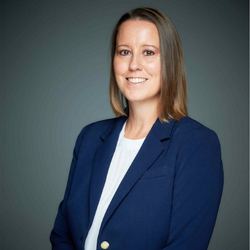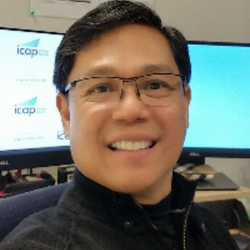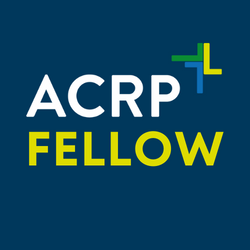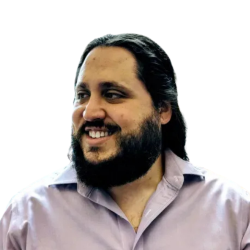The Association of Clinical Research Professionals (ACRP) is proud to welcome its new class of 2023 Fellows. Recognized with the FACRP designation as a thought leader in the clinical trial industry, each member has demonstrated commitment to advancing the clinical trial profession by sharing their experiences and mentoring others in the field.
“We are honored and excited to welcome two distinguished new members to this esteemed group,” said Susan Landis, Executive Director of ACRP. “Selection as an ACRP Fellow is recognition that you sit at the head of the class and are willing to share your knowledge to enhance the workforce and further elevate clinical trial quality.”
Meet the members of the ACRP Fellows class of 2023, and read what they had to say when asked about their careers and views on trends in the clinical research enterprise:
 Jill M. Clark, MBA, CCRC, ACRP-PM, FACRP, is the Deputy Chief of the Defense Health Agency’s Research and Engineering Clinical Investigations Program Office (CIPO). She is also the lead Scientific Program Manager for the Chief, Research Support Division and the Chief, CIPO. She has more than 20 years of deep experience leading transformation initiatives within research and development and regulatory affairs. She is skilled in developing research strategies, managing complex clinical trials, and creating and developing high-achieving teams. Prior to her current position, she held numerous leadership roles at the Nellis Air Force Base Regional Clinical Investigation Program and was the chief adviser to the Commander of the 99th Medical Group Medical on human subject research protections issues. She founded the former ACRP Nevada Chapter, is a member of the ACRP Greater Salt Lake City Chapter board, and advocates for other chapters as they focus on advancing clinical research education and training. She holds an MBA in Healthcare Management from the University of Phoenix and multiple certifications through ACRP.
Jill M. Clark, MBA, CCRC, ACRP-PM, FACRP, is the Deputy Chief of the Defense Health Agency’s Research and Engineering Clinical Investigations Program Office (CIPO). She is also the lead Scientific Program Manager for the Chief, Research Support Division and the Chief, CIPO. She has more than 20 years of deep experience leading transformation initiatives within research and development and regulatory affairs. She is skilled in developing research strategies, managing complex clinical trials, and creating and developing high-achieving teams. Prior to her current position, she held numerous leadership roles at the Nellis Air Force Base Regional Clinical Investigation Program and was the chief adviser to the Commander of the 99th Medical Group Medical on human subject research protections issues. She founded the former ACRP Nevada Chapter, is a member of the ACRP Greater Salt Lake City Chapter board, and advocates for other chapters as they focus on advancing clinical research education and training. She holds an MBA in Healthcare Management from the University of Phoenix and multiple certifications through ACRP.
 Avelino Loquere Jr., MD, RN, CCRP, CCRC, FACRP, is a physician and nurse by education and training, and has more than 20 years of clinical research experience. He was instrumental in launching a novel research site funded by the National Institutes of Health in the Harlem community in New York City, coordinating multiple HIV clinical trials conducted by diverse HIV clinical trials networks. He is currently the Clinical Trials Unit (CTU) Coordinator of the ICAP at Columbia University CTU overseeing two domestic and one international clinical research centers conducting HIV prevention research and, most recently, COVID-19 vaccine protocols. He has coauthored peer-reviewed research publications and oral/poster presentations mostly focused on HIV research efforts. Committed to the training and mentorship of students, he served as a mentor to graduate public health students from Columbia University through the ICAP Next Generation Internship Program. He has been an active member of ACRP since 2001 and earned his CCRC in 2006. In addition, he is a founding member of the ACRP New York Metropolitan Chapter and served as a member of the board of directors and chair of the membership and retention committee for 15 consecutive years (2005 to 2020). During this time, he helped grow the chapter into one of the top ACRP chapters in terms of membership.
Avelino Loquere Jr., MD, RN, CCRP, CCRC, FACRP, is a physician and nurse by education and training, and has more than 20 years of clinical research experience. He was instrumental in launching a novel research site funded by the National Institutes of Health in the Harlem community in New York City, coordinating multiple HIV clinical trials conducted by diverse HIV clinical trials networks. He is currently the Clinical Trials Unit (CTU) Coordinator of the ICAP at Columbia University CTU overseeing two domestic and one international clinical research centers conducting HIV prevention research and, most recently, COVID-19 vaccine protocols. He has coauthored peer-reviewed research publications and oral/poster presentations mostly focused on HIV research efforts. Committed to the training and mentorship of students, he served as a mentor to graduate public health students from Columbia University through the ICAP Next Generation Internship Program. He has been an active member of ACRP since 2001 and earned his CCRC in 2006. In addition, he is a founding member of the ACRP New York Metropolitan Chapter and served as a member of the board of directors and chair of the membership and retention committee for 15 consecutive years (2005 to 2020). During this time, he helped grow the chapter into one of the top ACRP chapters in terms of membership.
Q: Looking back on your clinical research career, what advice would you give the younger you who was just getting started in the profession? In other words, what is the most important thing you know now that you didn’t know then?
Clark: Gain education, but also get involved in clinical research early—whether that be through a volunteer opportunity, internship, or an entry-level position. That way, you will be simultaneously applying your education and beginning to build your career in the clinical research field.
Loquere Jr.: I would advise the younger me to read and fully understand the study protocol, to ask questions to collect accurate data, to recognize that participant retention begins at enrollment, and to always put study participant safety first.
Q: What have you found to be the secret to thriving in a long-term career in clinical research?
Clark: Clinical Research is a dynamic field, so you must be receptive to change. You must be able to adapt and use your critical thinking skills to problem solve issues and barriers that may arise.
Loquere Jr.: To thrive in a long-term career in clinical research, you must keep learning, know how to listen, be detail-oriented, and love what you do.
Q: What is the biggest change you’ve seen in clinical research during your career and/or what do you see as the profession’s biggest current challenge?
Clark: The biggest change that I have seen during the course of my career is the increasing reliance on technologies. It has made such a positive impact on participant engagement and on automation of the data collecting and reporting process.
Loquere Jr.: I think the biggest change was brought about by the COVID-19 pandemic restrictions. This has forced researchers to rethink and try new ways to conduct clinical trials and changed long-standing research practices, with some of those changes including remote recruitment, study monitoring, and sample collection; mailing study medications to participants; and reduction of study tests or visits becoming long-term or possibly permanent.
Visit the ACRP website for information about ACRP Fellowship, to view the ACRP Fellows roster, and to apply for the 2024 Class of Fellows.
Edited by Gary Cramer



